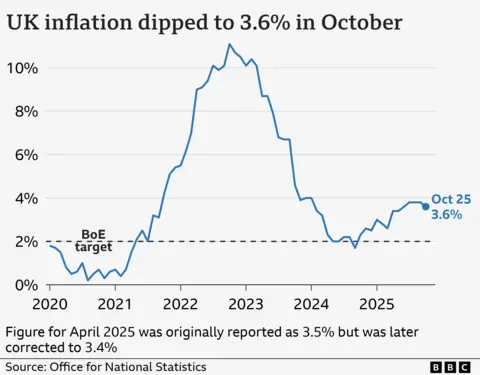
 Getty Images
Getty Images
The UK inflation rate fell to 3.6% in the year to October, but food prices rose again following a dip in September.
Prices are rising at their slowest pace for four months, helped by smaller rises in household energy costs and lower hotel costs, the Office for National Statistics (ONS) said.
However the dip in the rate of price rises, from 3.8% in September, was smaller than economists had forecast.
The latest inflation report comes just a week ahead of the government's much-anticipated Budget.
"I'm determined to do more to bring prices down," said Chancellor Rachel Reeves, after the latest data was released.
"I recognise that inflation and the cost of living is still a big burden of families across country," she said.
Reeves has said easing cost-of-living pressures is one of the main goals of the Budget, which is expected to see a combination of tax rises and spending cuts to shore up the government finances.
The biggest upward pressure on prices came from food and non-alcoholic drinks, the ONS said. The 12-month inflation rate for food was 4.9% in October, up from 4.5% in September.
Bread, meat fish, vegetables, chocolate and confectionary were among the products that rose in price. However fruit prices fell slightly.
The fall in inflation to 3.6% means prices are rising more slowly than they were and will foster hope that inflation has peaked, helping to pave the way for lower interest rates.
That in turn could mean lower mortgage and savings rates, but should also help encourage economic growth.
Inflation was last at 3.6% in June. In the months following that it edged up to 3.8%, before the fall in October.


"Inflation eased in October, driven mainly by gas and electricity prices, which increased less than this time last year, following changes in the Ofgem energy price cap," said ONS chief economist Grant Fitzner.
Household energy prices, which are capped by the regulator, rose in the year to October. But the 2% rise in the cap was significantly less than the 9.6% hike last year.
The ONS said another factor in the dip was the restaurants and hotels division, with room prices falling in October.
"The annual cost of raw materials for businesses continued to increase, while factory gate prices also rose," Mr Fitzner added.
Shadow chancellor Sir Mel Stride said: "Inflation has been above target every single month since Labour's last Budget, leaving working people worse off.
Liberal Democrat deputy leader Daisy Cooper said the chancellor "mustn't look this small gift horse in the mouth" and called for "emergency measures to slash people's energy bills" and a VAT cut for the hospitality sector.

 Movie
Movie 3 weeks ago
56
3 weeks ago
56 




![Presidents Day Weekend Car Sales [2021 Edition] Presidents Day Weekend Car Sales [2021 Edition]](https://www.findthebestcarprice.com/wp-content/uploads/Presidents-Day-Weekend-car-sales.jpg)




 English (United States)
English (United States)